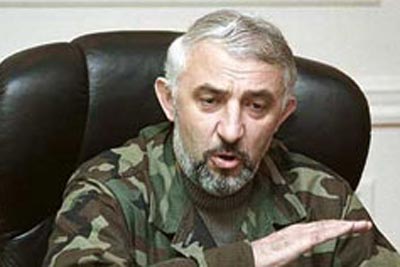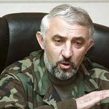
RIGHTS GROUPS ASK PUTIN TO TALK TO “MODERATE” REBELS
Publication: Eurasia Daily Monitor Volume: 2 Issue: 30
By:

A group of leading human rights activists, including Soviet-era dissidents Lyudmila Alexeyeva, Sergei Kovalev, and Father Gleb Yakunin, have sent an open letter to Russian President Vladimir Putin calling on him to accept Chechen separatist leader Aslan Maskhadov’s call for peace talks.
“For more than ten years — with a three year, very conditional break, Russia is in fact in a state of war in Chechnya,” read the letter, which was published by Novaya gazeta and the Grani.ru website, among other outlets, on February 9. “A war severe and terrible, with tens of thousands killed, hundreds of thousands maimed, with destroyed cities and industry. In these days a new opportunity for a way out of this bitter war has appeared — the political leader of the Chechen resistance, Aslan Maskhadov, not only ordered a unilateral ceasefire, but also denounced the actions of [rebel warlord Shamil] Basaev, recognizing him as deserving of an international tribunal, and thereby in a pointed way dissociating himself not only from him, but from the whole radical wing of the [separatist] fighters. This historic opportunity should in no way be missed.”
The letter’s signatories warned that if the war continues, the role of Islamic radicals among the Chechen separatists would continue to grow, as will the “radicalization of the civilian population.” “The radicals are absolutely not interested in a peaceful settlement, even if it is on the most advantageous terms for the secular wing of the separatists,” they wrote. “At the same time, the role of ultra-nationalists in Russian politics, who are prepared to use the Chechen conflict and terror for fascization of the country, will grow even faster. The conclusion from this is clear: the earlier an intelligible political dialogue between the Russian authorities and the moderate wing of the Chechen resistance begins, the greater the chance for a peaceful settlement in principle.” Negotiating with the moderates in the resistance is practically the only way “to prevent Chechnya from turning into another front in the confrontation between Islamist radicalism and Western civilization.” The letter concludes, “Mr. President, we call on you as commander-in-chief, guarantor of the constitutional rights of Russian citizens, and, above all, [guarantor] of the right to life, to give the order for a ceasefire in Chechnya and to organize a delegation for the start of negotiations with Maskhadov about a peaceful political settlement.”
The open letter was also signed by Novaya gazeta correspondent Anna Politkovskaya, Lev Ponomarev and Yuli Rybakov of the For Human Rights movement, Oleg Orlov of the Memorial human rights center, and Yuri Samodurov of the Andrei Sakharov Museum, among others.
Meanwhile, on February 10 President Putin met in the Kremlin with the United Nations High Commissioner for Human Rights, Louise Arbour. “We will listen with respect and react to an objective analysis of the issue, to every objective remark,” Interfax quoted him as saying at the meeting. “The only thing unacceptable for us is the use of human rights issues for economic or political purposes.”
Arbour also met with Russian human rights ombudsman Vladimir Lukin, Russia’s former ambassador to Washington. Briefing reporters about the president’s meeting with Arbour, Lukin said, “Violations of human rights concern us no less that our foreign partners,” Itar-Tass reported on February 10. Lukin added, “Those who equate terrorists and our armed forces are not right,” but, he conceded, “There is no justification for people with shoulder straps who violate human rights, and this happens from time to time.” Utro.ru said that Lukin demonstrated “brilliant diplomatic preparation” in his comments. “Briefly mentioning that the president, on his own initiative, touched on the extremely painful issue of Chechnya, he [Lukin] preferred to switch to violations of the rights of national minorities in the Baltic countries and to the subject of how the results of the election in Iraq have still not been announced,” the website wrote on February 10.
But while Arbour’s meetings scheduled for today [February 11] are also Kremlin-friendly — she is set to meet with, among others, Federation Council Chairman Sergei Mironov and State Duma International Affairs Committee Chairman Konstantin Kosachev — she also plans to meet with a group of human rights activists at the offices of the Memorial human rights center on February 12. “I will personally speak [to her] about how the human rights situation has catastrophically worsened recently,” Lev Ponomarev told Utro.ru. “The main issue for Russia today, the ulcer that is eating away at and influencing the situation around the whole country is, of course, the war in Chechnya, where the right of the individual to life is being violated in a cruel way, where the kidnapping of people continues.”
Ponomarev said he would also bring up “the attack on social rights” exemplified in the monetization of benefits and the reappearance of political prisoners. “The siloviki who have come to power in the country have begun battling the opposition in a crude way and are fabricating criminal cases against political opponents, the leaders of civic organizations,” he said. “But the most dangerous thing is that the authorities have moved to massive repression, which sooner or later happens in any police state.” Ponomarev pointed to the events in Blagovashchensk, Bashkortostan, at the end of last December, when riot police reportedly carried out a “crime prevention operation” in which hundreds of men and teenage boys were detained and beaten up, and scores of girls raped (MosNews, January 21).




